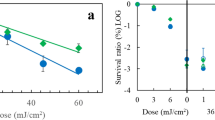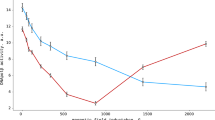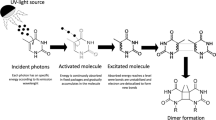Abstract
IT has been shown1,2 that ultra-violet irradiation produces in some kinds of bacteria, for example, Escherichia coli B/r and Salmonella typhimurium, a temporary inhibition of deoxyribonucleic acid (DNA) synthesis. The synthesis is resumed after 30–60 min. and proceeds at a rate similar to the control, but the surviving bacteria are growing only in mass, having lost their ability to form colonies. One of the possible explanations for such behaviour is that DNA synthesized after temporary inhibition is different from the normal one. That this might be so is supported by Kanazir et al.3, who found that whereas DNA from non-irradiated Sal. typhimurium could reduce the damage to an irradiated culture, that from an irradiated culture could not, and by Hudnik and Glisin4, who showed that the thermal denaturation pattern followed by viscosity and ultra-violet absorption measurement was different in the two DNA's.
This is a preview of subscription content, access via your institution
Access options
Subscribe to this journal
Receive 51 print issues and online access
$199.00 per year
only $3.90 per issue
Buy this article
- Purchase on Springer Link
- Instant access to full article PDF
Prices may be subject to local taxes which are calculated during checkout
Similar content being viewed by others
References
Kelner, A., J. Bacteriol., 65, 252 (1953).
Kanazir, D., and Errera, M., Cold Spring Harbor Symp. Quant. Biol., 21, 19 (1956).
Kanazir, D. T., Cecuk, O. Z., Krajincanic, B. N., and Hudnik, T. A., Bull. Inst. Nuclear Sci., “Boris Kidrich” (Belgrade), 9, 133 (1959).
Hudnik, T. A., and Glisin, V., Bull. Inst. Nuclear Sci., “Boris Kidrich” (Belgrade), 11 (in the press).
Ord, M. G., and Stocken, L. A., Biochim. Biophys. Acta, 37, 352 (1960).
Bendich, A., Pahl, H. B., Korngold, G. C., Rosenkranz, H. S., and Fresco, J. R., J. Amer. Chem. Soc., 80, 3949 (1958).
Zamenhof, S., Reiner, B., de Giovanni, R., and Rich, K., J. Biol. Chem., 219, 165 (1956).
Kirby, K. S., Biochem. J., 66, 495 (1957).
Lowry, O. H., Rosebrough, N. J., Farr, A. L., and Randall, R. J., J. Biol. Chem., 193, 265 (1951).
Ceriotti, G., J. Biol. Chem., 198, 297 (1952).
Burton, K., and Petersen, G. B., Biochem. J., 75, 17 (1960).
Mandelstam, J., Baceteriol. Revs., 24, 289 (1960).
Burton, K., Biochem. J., 77, 547 (1960).
Beukers, R., and Berends, W., Biochim. Biophys. Acta, 49, 181 (1961).
Wacker, A., Dellweg, H., and Weinblum, D., Naturwiss., 47, 477 (1960).
Author information
Authors and Affiliations
Rights and permissions
About this article
Cite this article
HUDNIK-PLEVNIK, T., STOCKEN, L. Chromatography and Nucleotide Sequences of Deoxyribonucleic Acid synthesized in Salmonella typhimurium after Irradiation with Ultra-Violet. Nature 192, 554–555 (1961). https://doi.org/10.1038/192554a0
Issue Date:
DOI: https://doi.org/10.1038/192554a0
Comments
By submitting a comment you agree to abide by our Terms and Community Guidelines. If you find something abusive or that does not comply with our terms or guidelines please flag it as inappropriate.



